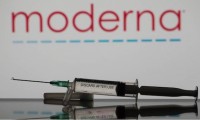-
Pfizer and Flagship Pioneering Sign Drug Discovery Partnership Worth up to $7bn
- Source: drugdu
- 111
- July 24, 2023
-
Pfizer, Flagship Team Up in $100M R&D Pact — 10 New Drugs for Unmet Needs
- Source: drugdu
- 129
- July 20, 2023
-
Obesity Drug Maker Versanis to Be Bought by Eli Lilly for $1.9 Billion
- Source: drugdu
- 109
- July 18, 2023
-
NVIDIA Invests $50m in AI-enabled Drug Discovery
- Source: drugdu
- 126
- July 17, 2023
-
EMA Concern Stirs over Suicide Risk with Weight Loss GLP-1RA Drugs
- Source: drugdu
- 106
- July 14, 2023
-
Safety Concerns About New Weight Loss Drugs Brew as Demand Soars
- Source: drugdu
- 112
- July 9, 2023
-
Moderna strikes deal to develop mRNA drugs in China
- Source: drugdu
- 97
- July 8, 2023
-
Zealand Pharma submits NDA for hyperinsulinism drug dasiglucagon
- Source: drugdu
- 114
- July 5, 2023
-
Lantidra wins FDA approval as first-ever type 1 diabetes cell therapy
- Source: drugdu
- 206
- July 3, 2023
-
Eli Lilly experimental obesity drug helped patients lose up to 24% of their weight, study says
- Source: drugdu
- 111
- June 29, 2023
your submission has already been received.
OK
Subscribe
Please enter a valid Email address!
Submit
The most relevant industry news & insight will be sent to you every two weeks.













